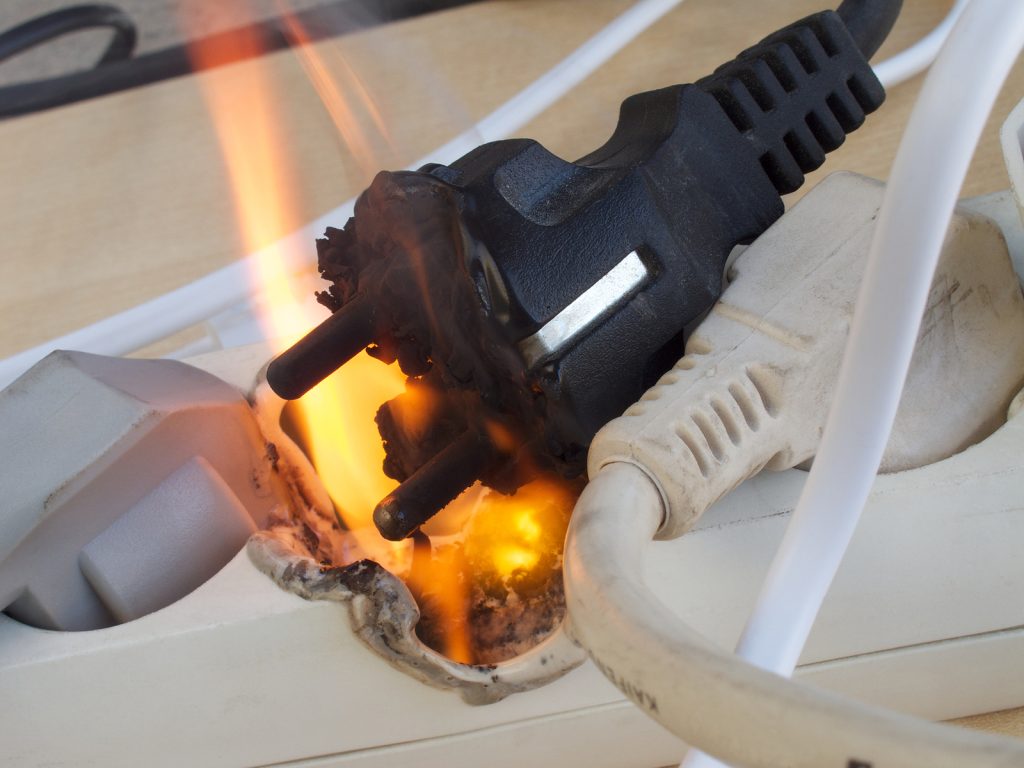Important: Electrical fire can be dangerous and deadly. This website and blog are for informational and educational purposes only. Call 911 ASAP, if the fire is out of your control.
An electrical fire is one of the most dangerous types of fire. It can start with something as simple as a faulty wire or an overloaded outlet, and before you know it, the whole room is on fire. If you know how to put out an electrical fire, you can save yourself and your family from a potentially deadly situation.

If you don't know how to put out an electrical fire, read on! In this article, we'll discuss the different ways to extinguish an electrical fire, as well as some prevention tips to help you avoid one in the first place. Electrical inspections from Titan Plumbing And Electric can help you avoid electrical fires. We'll also cover how to stay safe while putting out an electrical fire.
How Do You Extinguish an Electrical Fire?
It is good to avoid electrical fires, but in case one does start, it is important to know how to extinguish it. Even if you don't have a fire extinguisher, there are steps you can take to put out the fire.
The best way to extinguish an electrical fire is to use a Class C fire extinguisher. If you don't have a Class C extinguisher, you can try using a bucket of water. However, be careful not to get too close to the fire, as it can still be dangerous.
Safety First!
Before you do anything, make sure it is safe to approach the fire. Do not put yourself in danger by trying to extinguish a fire if it is too dangerous to get close. Start by calling 911 and remember to inform the dispatcher that it's an electrical fire. If you can't turn off the electricity, it may be best to evacuate. Be sure you have at least two clear paths to safety should you need to evacuate.
Disconnect The Electricity Supply
If it is safe to do so, disconnect the electricity supply to the area where the fire is burning. This will help reduce the chances of the fire spreading. Cutting off the electricity supply to your home eliminates the chances of electrocution. If the fire is from an appliance, unplug it immediately if it's safe to do so.
Don't Use Water While The Power is on
Water and electricity don't mix, so using water to put out an electrical fire is not a good idea. You could get electrocuted if you use water on an electrical fire while the power is still on. This is because water is a conductor of electricity.
Use A Fire Extinguisher
If you have a fire extinguisher, this is the best way to put out an electrical fire. Make sure you know how to use it before trying to extinguish the fire. Remember to aim at the base of the flames, not the smoke.
Baking Soda Works For Small Electrical Fires
Baking soda can also be used to extinguish a small electrical fire. It helps to have some baking soda lying around. Pour it on the flames and then smother with a wet cloth. If the fire is from an appliance, disconnect the power supply and pour baking soda on the flames. Baking soda contains sodium bicarbonate, which is a chemical compound that can help extinguish fires. It is used in Class C fire extinguishers.
How to Put Out an Electrical Fire When The Power is Off
If the power is off, you can use a fire blanket in the absence of a fire extinguisher. Cover the entire fire with the blanket and then use a weight, like a brick, to hold it in place. This will suffocate the fire by cutting off the oxygen it needs to burn. You can now also use water to extinguish the fire. With a bucket, pour it on the flames from a distance and do not go near the fire.
Prevention is the Best Way to Avoid an Electrical Fire
The best way to avoid an electrical fire is by practicing safe habits. Here are a few things you can do to help prevent an electrical fire:
-Don't overload outlets - this can cause a fire.
-Make sure all cords are in good condition and don't have any exposed wires.
-Don't use appliances with frayed cords.
-If an appliance starts smoking, unplug it and call a professional.
-Don't put space heaters near curtains or other flammable materials.
-Keep flammable materials, like paper and magazines, away from heaters.
-Install smoke detectors and carbon monoxide detectors in your home.
-Practice fire safety by having a plan in case there is a fire in your home.
Prevent Electrical Fires With Our Electrical Inspections
An electrical fire can be a frightening experience. By knowing how to extinguish an electrical fire, you can help minimize the damage and keep yourself safe. Prevention is the best way to avoid an electrical fire, but accidents can happen. That's why it's important to have a trusted electrician do regular electrical inspections of your home. At Titan Plumbing And Electric, our electricians are licensed and insured. Call us today at (813) 933-8010 for more information or to schedule an appointment.


